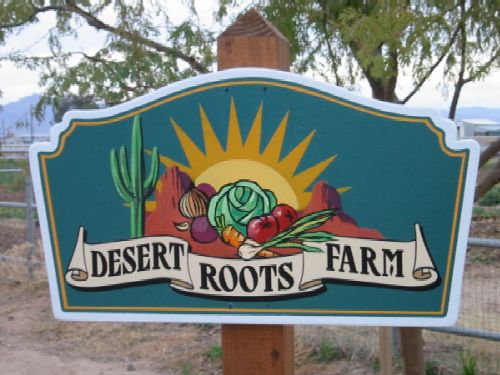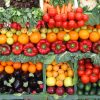 I have a rare treat today! I recently interviewed a wonderful, inspirational woman farmer named Kelly Saxer. Kelly is the famer and owner for one of the local CSA programs in my area called Desert Roots Farm I have known Kelly for awhile so I thought it was about time I interview her and share her knowledge with my blog readers. She gives us some tips on growing your own food and perhaps even starting your own local CSA. Enjoy!
I have a rare treat today! I recently interviewed a wonderful, inspirational woman farmer named Kelly Saxer. Kelly is the famer and owner for one of the local CSA programs in my area called Desert Roots Farm I have known Kelly for awhile so I thought it was about time I interview her and share her knowledge with my blog readers. She gives us some tips on growing your own food and perhaps even starting your own local CSA. Enjoy!
Tiffany: What exactly is a CSA?
Kelly: CSA stands for Community Supported Agriculture. CSA is a partnership of mutual commitment between a farm and a community of supporters which provides a direct link between the production and consumption of food. Supporters cover a farm’s yearly operating budget by purchasing a share of the season’s harvest. CSA members make a commitment to support the farm throughout the season, and assume the costs, risks and bounty of growing food along with the farmer or grower. Members help pay for seeds, fertilizer, water, equipment maintenance, labor, etc. In return, the farm provides, to the best of its ability, a healthy supply of seasonal fresh produce throughout the growing season. Becoming a member creates a responsible relationship between people and the food they eat, the land on which it is grown and those who grow it.
Tiffany: What motivated you to start such a program?
Kelly: Ever since I was little and helping my grandpa in his vegetable garden, I’ve had an interest in agricluture. As a child, I remember being in awe of the fact that you could put a seed in the ground, add a little water and sun and that would grow into something you could eat – crazy! While I have always been interested in farming and agriculture, I didn’t think I could make a career out of it. So, I went to college and got a degree in Accounting and went to work doing corporate taxes. After about 4 years of that, I knew that I wanted to do something different with my life. So, I decided to go back to school and get a Masters degree in Agribusiness.
While I was doing the master’s program, I met a few local farmers who participated in valley farmers markets, got to know them, learned how they got their start, etc. and I was hooked. I was so excited to learn that it was actaully possible to make living with small-scale farming…especially with the CSA model. So, I searched for some land to get started and I was off.
Tiffany: Has running a CSA been difficult?
Kelly: Farming is definitely not an easy way to make a living. There are much easier, less time-consuming ways to make an equivalent amount of money. But, there are certainly benefits that I wouldn’t trade for anything….no cubicle to be stuck working in, I get to work outside, and control of my own work schedule, to mention a few. The biggest challenge of running a CSA is ensuring that I have a decent selection and variety of vegetables to offer my members every single week for at least 42 weeks a year. This takes quite a bit of planning and a good understanding of the climate, environment and seasons in your area. Also, I am constantly planting year-round so that I have a continuous sequence of generations of veggies – some ready to harvest, some that are a little younger and ready to go in a few weeks and some just planted, etc.. If anything messes with my schedule (like weather…), I’ll might find myself short on vegetables a few months later. And of course, things rarely go as planned with organic farming…even if I schedule everything just right, I’ve got bugs, birds and animals just waiting for the opportunity to dine on my veggies before I get a chance to harvest them. So, the biggest challenge of CSA is, by far, the pressure of having veggies every single week.
Tiffany: What feedback have you gotten from members?
Kelly: I’ve been getting great feedback from my members. Of course, CSA is not for everyone. My happiest customers are those that are committed to eating local and in-season vegetables. Unlike what you find in the grocery store, not all veggies are in season all the time. So, CSA works best for people who can take what’s in season and design their menu around the foods that are available. If you’re a picky eater, you won’t be happy with CSA.
Tiffany: What rewards do you experience?
Kelly: I love harvest days…it’s pretty rewarding to see all the vegetables that I’ve worked so hard to grow. Also, I love to hear from my members that they’re enjoying the veggies….I get e-mails from folks sharing great recipes they’ve discovered or stories about how their child wouldn’t eat broccoli from the store, but loves our broccoli, etc.. It’s a great feeling to know you’re producing and delivering high quality, healthy vegetables to your customers.
Tiffany: Do you have any advice for others who want to grow sustainable food for themselves or perhaps start a CSA in their own area?
Kelly: I would certainly encourage anyone to grow their own food or even start their own CSA. My biggest bit of advice would be to really get to know and understand the seasons in your area. It’s not enough to know that summers are hot and winters are cold. You need to be sensitive to your environment and learn what grows best in your area….by motto is “don’t fight mother nature….it’s a lot easier to work with her”. You’ll be more successful if you adapt to your environment, rather than try to manipulate your environment to suit your needs.
Tiffany: Has your CSA activity motivated other life changes in either you or your members in regards to sustainable living.
Kelly: .Many people start farming or gardening because they want to enjoy the vegetables….my interest originated from the growing/farming process, rather than the end product – the vegetables. I’m not much of a cook, but over the years of growing all these great vegetables my husband and I have drastically changed our eating habits to include more vegetables and are much healthier, as a result. So, that has been a big and positive change in my life. Also, I don’t look at food the same anymore…it’s not just a commodity in my eyes…I know the hard work and heart that goes into producing good, quality food. I think that many of my CSA members have come to that same realization. When you know your farmer, listen to their stories of success and hardship throughout the growing season, it’s hard to ignore the connection. That’s the great thing about CSA – it brings you back to reality (food doesn’t come from grocery stores, it comes from farmers and ranchers and many other hard-working people in this world).

